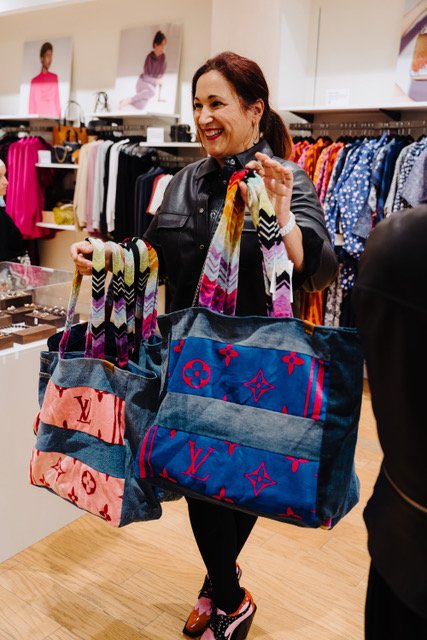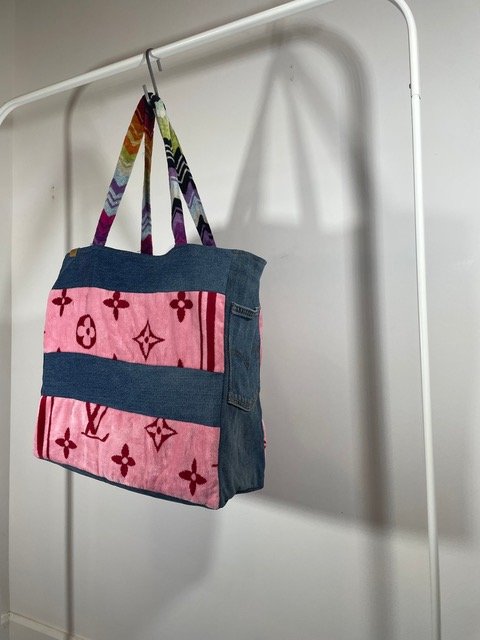RESCUING TEXTILES - CAN AN UPCYCLED HANDBAG DESIGNER COMPETE IN THE LUXURY MARKET?
By: Hillary LeBlanc
Handbag designers are faced with many crucial choices when conceptualizing pieces to add to their collection in order to compete with a very saturated market for their product to stand out. Adding further challenge is maintaining integrity with sustainable values. One of the bigger obstacles is fighting with the speed in which fast fashion retailers are creating the next trend, making it very difficult for a small business to source materials and keep up with the speed at which fashion trends change. This is mainly due to lack of resources as a smaller business, something many independent designers like Ivana Walker can relate to.
Walker was just a teenager when accessories captivated her. Walker tells us she was “one of few women pursuing this field at George Brown College”. At the beginning of her education 30 years ago, Walker was taught to be mindful of waste mainly because gold is a very expensive material. When transitioning later in her career to work with other materials, it was important for her to consider the use of items that were sitting to the side, instead of looking at these pieces as scraps. This became a pursuit to create and design using discarded or left over materials.
Anavi Designs was founded in 2017 by Walker who’s pieces include several sustainable options from repurposed denim, to fake fur and even vegan leathers. “I found myself looking at my closet and seeing all the jeans, like many others, that did not fit anymore so I set my focus on the denim industry and the waste of denim in the landfills, let alone the issue with how much water is used to create one pair. I started cutting, matching, looking at possibilities of how denim could be used in our handbags.” Though using denim is not a new concept to the handbag industry, Walker hoped to ”refocus its repurposing abilities” by using ideas that were new to the market. While playing around with excess denim during the lockdown, she formulated a tote that was in her words, “unique and fun”.
Walker, who has a loyal customer base, does compete with luxury sustainable brands head to head, which can bring forth a lot of benefits. “Although most luxury brands focus on quality, their products are usually made abroad and don’t focus on creating jobs within North America in the slow fashion model. As a small business owner I am aware that my customers believe in the importance of knowing my brand, knowing me as the owner, knowing the quality of my product and that keeps them coming back. I am also able to be transparent about how I source all products. In an era of green washing I have learned the importance of having great customer/brand relationships, this has been crucial for me to win and maintain sustainable conscious consumers”.
Walker feels she stays relevant in this competitive market because accessories will never die out. She says, “Accessories are an extension of expressing ourselves, and those who wear a sustainable accessory have decided to express that information about themselves. This trend will stay in the forefront because we as a society are very concerned about this topic”. Keeping up with trends is something Walker says she is able to do naturally as an artist, “listening and watching what is being discussed is how I stay on Trend”.
Walker shares that it is important to be mindful of all materials used in accessories, and specifically her handbags. “When traveling I specifically go to small independent stores, talk to the owners and ask them of anything that is out of the ordinary, which is how pieces of designer leather that would have ended up in the landfill will be picked up by an upholstery store. While keeping her textile hunt independent she does find that consumer education on harmful textiles is lacking, “It amazes me the number of people who are unaware of how harmful the process of creating denim fabric is to the environment and how important it is for our future generations to improve the textile industry so that it becomes more eco friendly. White most consumers are aware of reusing, recycling and reducing most household objects, knowledge is still lacking with regards to textiles. It is so important for consumers to understand how to reduce textile purchases, reuse textiles and upcycle”.
When Walker is given the chance she loves to encourage sustainability by explaining to her clients how she acquired the materials, sharing the history and value of her work builds an authentic appreciation with the consumer.
Walker’s creative process also separates her from luxury brands by having complete control over her creative process. She starts by looking at what the handbags or accessories could be as opposed to looking at the textiles in front of her and trying to conceptualize from there like most designers do in a bigger retail brand. She asks herself, “what is the purpose and what would make it feel elevated for the customer.” As a small business owner she also has the advantage of being able to take direction from her clients. “There is a lot of information given while the client is talking. I listen to the adjectives in their description of what they would like and from those adjectives, I will start asking a series of questions on the use of the bag, and if it needs to fit set requirements.” These requirements can include what the size should be based on the customer’s day to day life but not always the size the customer usually uses. Walker shares that the functionality of the bag plays a “large part in my designing and the ability to get multiple uses of the piece, for example when traveling, being hands free for children, etc”.
What Walker offers that separates her from luxury sustainable companies is being a personable designer building a constant rapport with her clients. Her bags speak to the direct needs of her clients and by keeping her work collaborative she is consistently mindful of waste. Looking to the future, Walker intends to continue to collaborate with artists as opposed to viewing them as competition especially while trying to be kind to the planet.



